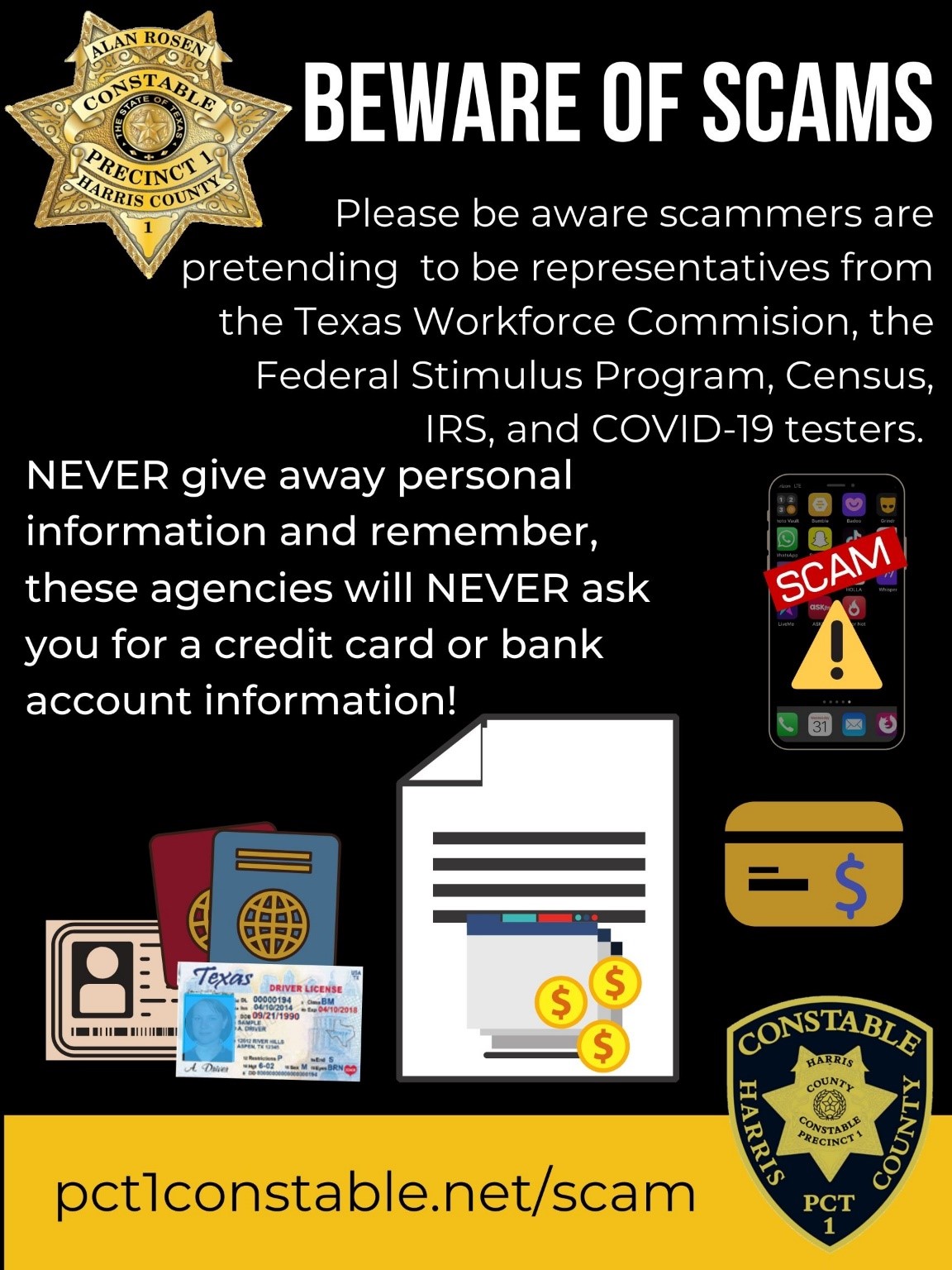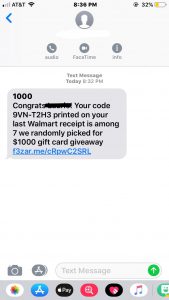
The global pandemic has spawned new sophisticated scams preying on unsuspecting victims. Please be skeptical of any unsolicited caller claiming to represent the Texas Workforce Commission, the Federal Stimulus Program, the IRS, or selling fake COVID-19 test kits or vitamin supplements. Check the Federal Trade Commission website, Better Business Bureau, and when in doubt, hang up and call the agency immediately. Remember, these agencies will never ask for your credit card or bank account information. We found the following links helpful below.
FBI Expects a Rise in Scams Involving Cryptocurrency Related to the COVID-19 Pandemic
BBB tips on COVID-19 (coronavirus) Don’t panic, be safe, and avoid scams
Wobbly Wheel
A warning for Houston drivers about the wobbly wheel scam. Perpetrators try to get your attention while you’re driving.
Traffic Scam Warning
How to protect yourself while driving if you are targeted by scammers.
Utility Worker Scam
How to stop scammers that pose as utility workers from gaining access to your house. Please ask for company identification and/or work orders to ensure they are legitimate.
Dangerous Robbery Scam
Teenagers are suspected in scamming victims in the Montrose area of Houston. A young lady approaches saying that she is a rape victim and as you call 911 a male suspect appears with a shotgun.
Mystery Shopper Scam
A warning from Harris County Constable Rosen after his own wife almost fell victim to a scam. Jennifer Rosen thought she was signing up for a mystery shopping experience but the instructions she received were not legit.
Contractor Scam
Contractor arrested: Accused of ripping off victims including those devastated by Hurricane Harvey.
Additional Resources
Top 10 Most Common Scams List
From the Better Business Bureau of Houston
From the classics to the innovative, this top ten list includes the most popular scams and fraud schemes of the past year with some new additions to look out for in the coming months!
#10 Sweepstakes Scam: You are notified that you have won a contest or the lottery; but claim your prize you first must pay fees or taxes.
Recommended Action: No real lottery or sweepstakes will ever request money in advance. Do a quick internet search to verify a sweepstakes if you are concerned about its legitimacy.
#9 Romance Scam: Romance scammers contact their victims through online dating websites, social media or sometimes Facebook. The scammer’s intent is to establish a relationship with the victim and use that relationship to dupe them out of money, usually for an “emergency.”
Recommended Action: Always be wary about the personal info that you post. Assume that con-artists are trolling even the most reputable sites. If you develop a romantic relationship with someone you meet online, research their identity and be suspicious of any requests for money or personal info.
#8 Secret Shopper Jobs: Scammers use newspaper ads and emails to create the impression that mystery shopping jobs are a gateway to a high-paying job with reputable companies. Also, they often send notices through the mail with a check (fake) included to wire to an unnamed company and to pay you for your first job.
Recommended Action: Don’t pay an application fee or deposit a check and wire money on to someone else you don’t know.
#7 Medicare/Healthcare Scam: Someone may call and pose as a Medicare representative to get your personal information, such as your Medicare number. They will bill Medicare for bogus products or services that you never qualified for or in most cases never received.
Recommended Action: Never provide personal info over the phone. Be sure to keep an eye on your Medicare Summary Notices to catch such errors, abuse, and FRAUD. Report any suspicious behavior to the Texas Senior Medicare Patrol at 888-341-6187.
#6 Emergency Scam: This one is sometimes called the “grandparent scam” because it often preys on older consumers. You get a call or email from your grandchild or other relative who was injured, robbed or arrested while traveling overseas and needs money ASAP.
Recommended Action: Do not send money or buy gift cards!! Ask the caller for the family “code word” even if you don’t have one (but get one soon).
#5 “Risk-free” Trial Offers: You’ve seen them on the television and Internet: ads or links claiming these “miracle” products will help you lose weight easily, combat wrinkles or whiten teeth. You may be enticed to try these products through a “risk-free” trial offer, however many of us fail to look at the fine print where you discover you have only 14 days to receive, evaluate and return the product before being charged $100 or more for monthly shipments.
A tip on free trials: If you have to enter a credit card number for something “free,” that’s a red flag.
#4 Utility Company Scams: These scams vary but often include one of the following situations.
Utility scams happen when fraudulent utility companies hire and train door-to-door sale representatives to come to your home and convince you they can save you money on your electricity or gas bill. They will either try to gain access to your account information to switch your service without permission, or offer low-low rates for the first couple of months then hit you with a steep price hike.
Scammers often use emails and phone calls stating there are problems with your utility account and they will be shutting off your service immediately. This is often a ploy to get your personal information, like credit card numbers or social security numbers. Get the telephone number from your last bill and check whether it’s real or not. Do not use the phone number listed in the email or click the link provided.
Recommended Action: Your safest course of action to avoid getting caught up in one of these scams is to not open your door or respond to emails/phone calls from strangers.
#3 Phone scams:
Neighborhood spoofing: is a tactic in which fraudsters show up as a local number on your caller ID by matching the first six digits of your number. It is estimated that 9 in 10 scam calls will come from a familiar area code in 2019.
Robocall Scam: Scam calls are getting more frequent — and quickly. In 2019, nearly half of all calls to mobile phones will be fraudulent. Robocalls will always give you the option to be removed from their call list by pressing a certain number. Hang up and do not press anything! This will only confirm that there is a live person on the other end of the phone and they will keep calling back.
Recommended Action: Don’t answer phone calls from numbers you don’t recognize and contact your mobile phone carrier and use the services/apps they provide to stop spam calls.
#2 Tech Support Scam: You get a call or a pop-up on your computer claiming to be from Microsoft (or Norton, or Apple) about a problem on your computer. They say if you give “tech support” access to your hard drive, they can fix it.
Recommended Action: Never click on pop-up links. Contact the tech support company directly for tech support using the number on their website not the one in the pop-up.
And the top Scam of the Year, because it’s just so terrifying, is:
#1 Arrest Scam: You receive an ominous phone call from someone claiming to be a police officer or government agent (often the IRS). They are coming to arrest you for overdue taxes or for skipping out on jury duty… but you can avoid it by sending them money via a prepaid debit card or wire transfer.
Recommended Action: Hang up and contact the agency directly using a phone number from an independent source, such as a past bill or online search.
Helpful Tips
Avoiding the scam rules to live by:
• Don’t be pressured into making fast decisions.
• Take time to research the organization. Check them out on bbb.org, search online, etc.
• Never provide your personal information (address, date-of-birth, banking information, ID numbers) to people you do not know.
• If you are unsure about a call or email that claims to be from your bank, utility company, etc., call the business from the number on your bill or the back of your credit card. Never send money by wire transfer or prepaid debit card to someone you don’t know or haven’t met in person.
• Never send money for an emergency situation unless you’ve been able to verify the emergency.
• Always be ware of anyone calling, knocking on your door or workplace asking for personal information such as verifying your name, social security or credit information.
• Even if they seem legit, always ask them to identify themselves. Ask to see a badge or employer ID card.
• Never post personal information on social media
• Beware of shopping online
• Check your bank statements and credit reports often, scan for unauthorized transactions
• Change your pin code on your credit card and update your passwords regularly
• Listen for these RED FLAGS:
• At some point, the scammer will ask request that you urgently send them money, “immediately”, “sooner the better”, “right away” “act fast” or else, etc.
• OR they will ask for some personal information such as your social security number, date of birth, or bank account and routing number, etc.
• Sometimes, if they’re sophisticated enough and they’ve already got your name, D.O.B. age and phone number but then they ask you to verify something, that is also a red flag.
• Don’t be pressured into making fast decisions.
• Take time to research the organization. Check them out on bbb.org, search online, etc.
• Never provide your personal information (address, date-of-birth, banking information, ID numbers) to people you do not know.
• If you are unsure about a call or email that claims to be from your bank, utility company, etc., call the business from the number on your bill or the back of your credit card. Never send money by wire transfer or prepaid debit card to someone you don’t know or haven’t met in person.
• Never send money for an emergency situation unless you’ve been able to verify the emergency.
Call the Better Business Bureau of Houston with any questions 713-341-6141
If you think you’ve been the victim of a scam, please contact your local law enforcement non-emergency hotline.
Subscribe to Precinct One Public Safety Updates
Click Here
Subscribe to Precinct 1 crime alerts here
Click Here


